Without pointing guns at Crimean respondents, an April 2014 Pew Poll using face to face interviews found 91% of Crimeans view their March 16, 2014 referendum to rejoin Russia as free and fair. Propagandists had claimed such results could only have been obtained at the point of a Russian gun, per NY Times. “With thousands of heavily armed Russian troops occupying” Crimea, voters were under “duress of Russian military intervention,” per Obama. As a point of information, by agreement in effect until 2042, 25,000 Russian troops can be occupied 24/7 in Crimea. If you didn’t know that and read NY Times 3/16/2014 opening sentence about “thousands of heavily armed Russian troops” in Crimea, preceded by its scary headline that voting occurred “as Russian troops keep watch," you’d be free to incorrectly assume that Russian troops had invaded Crimea and intimidated voters. As it happens, in addition to 25,000 troops, Russia is allowed to keep “132 armored combat vehicles and 24 pieces of artillery at its military facilities in Crimea.” The same long term agreement allows Russia to use Crimean Black Sea ports and Crimean naval facilities for its fleet.
May 14, 2014, “Despite Concerns about Governance, Ukrainians Want to Remain One Country,” Pew Poll
April 5-23, 2014 survey in Ukraine by Pew Research Center, face-to-face interviews with 1,659 randomly selected adults from across the country, Ukraine error margin 3.3:
[Scroll down]: “Crimean residents are almost universally positive toward Russia. At least nine-in-ten have confidence in Putin (93%) and say Russia is playing a positive role in Crimea (92%). Confidence in Obama is almost negligible at 4%, and just 2% think the U.S. is having a good influence on the way things are going on the Crimean peninsula.
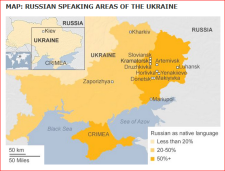 International attention has focused on Crimea in large part due to the March 16th referendum on seceding from Ukraine and joining Russia. According to the reported results, most of the Crimean residents who participated voted for secession….Few
in the international community have accepted the outcome. [What is
definition of “international community?” Do links exist detailing how it
computes what it “accepts”? If the “community” doesn’t accept Crimea’s March 2014 referendum “outcome,” would they "accept the outcome” of April 2014 Pew Poll results?]
International attention has focused on Crimea in large part due to the March 16th referendum on seceding from Ukraine and joining Russia. According to the reported results, most of the Crimean residents who participated voted for secession….Few
in the international community have accepted the outcome. [What is
definition of “international community?” Do links exist detailing how it
computes what it “accepts”? If the “community” doesn’t accept Crimea’s March 2014 referendum “outcome,” would they "accept the outcome” of April 2014 Pew Poll results?] For their part, Crimeans seem content with their annexation by Russia. Overwhelming majorities say the March 16th referendum was free and fair (91%) and that the government in Kyiv ought to recognize the results of the vote (88%).
In Russia proper, the public also sees the matter as closed. More than eight-in-ten Russians (84%) think the March 16th referendum was fair and even more (89%) say Kyiv ought to validate the results, according to a new Pew Research survey in Russia, conducted among 1,000 randomly selected adults between April 4-20….
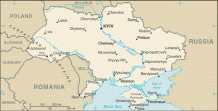 Putin appears to have scored a political victory at home with his handling of the Ukraine crisis. More than eight-in-ten Russians (83%) express confidence in Putin to handle world affairs. At the same time, 92% have a favorable view of their country, including 51% who express a very favorable opinion of their homeland – up 22 percentage points from last year [2013].
When it comes to Russia’s image abroad, a 43%-plurality of Russians
think Putin’s response to the situation in Ukraine has made people in
other countries more favorably inclined toward Russia; just 26% think it has had the opposite effect….
Putin appears to have scored a political victory at home with his handling of the Ukraine crisis. More than eight-in-ten Russians (83%) express confidence in Putin to handle world affairs. At the same time, 92% have a favorable view of their country, including 51% who express a very favorable opinion of their homeland – up 22 percentage points from last year [2013].
When it comes to Russia’s image abroad, a 43%-plurality of Russians
think Putin’s response to the situation in Ukraine has made people in
other countries more favorably inclined toward Russia; just 26% think it has had the opposite effect….Crimeans Happy with Simferopol, Critical of Kyiv
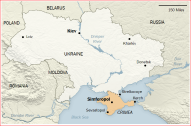 Crimeans are very satisfied with the leadership in Simferopol. Roughly eight-in-ten (83%) say Prime Minister Sergey Aksyonov is having a good influence on the way things are going in Crimea. Similarly, 82% give the government in Simferopol high marks….
Crimeans are very satisfied with the leadership in Simferopol. Roughly eight-in-ten (83%) say Prime Minister Sergey Aksyonov is having a good influence on the way things are going in Crimea. Similarly, 82% give the government in Simferopol high marks…. In stark contrast, Crimeans are extremely critical of the government in Kyiv. Fewer than one-in-ten (7%) think the Ukrainian government respects personal freedoms. And just two-in-ten say the upcoming elections for the next administration in Kyiv will be conducted fairly….
(p. 4) Increasingly Negative Views of U.S., EU
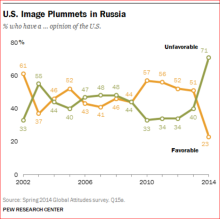 Russian opinions of the U.S. are at their lowest point since Pew Research began polling in Russia 12 years ago [2002]. Only 23% give the U.S. a favorable rating, down sharply from 51% last year.
Russian opinions of the U.S. are at their lowest point since Pew Research began polling in Russia 12 years ago [2002]. Only 23% give the U.S. a favorable rating, down sharply from 51% last year. Previously, the lowest favorability rating for the U.S. was 37%, registered in May 2003, shortly after the start of the Iraq war, when ratings for the U.S. were at a nadir in many countries.
Ratings for President Obama are also negative. Only 15% of Russians say they have confidence in the American leader to do the right thing in world affairs.
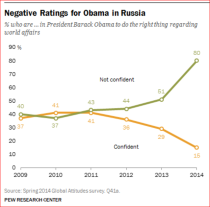 Eight-in-ten lack confidence in Obama, up from 51% last year and 44% in 2012.
Eight-in-ten lack confidence in Obama, up from 51% last year and 44% in 2012.Attitudes toward the EU have also turned sharply negative. Only 39% of Russians express a favorable opinion of the institution, down from 64% in 2011.”…
..........................................
Added: Two additional polls reinforce findings of above April 2014 Pew Poll: June 2014 Gallup Poll and a 2015 poll by German company Gfk. Per March 20, 2015 Forbes:
3/20/2015, “One Year After Russia Annexed Crimea, Locals Prefer Moscow To Kiev,” Forbes
“In June 2014, a Gallup poll with the Broadcasting Board of Governors asked Crimeans if the results in the March 16, 2014 referendum to secede reflected the views of the people. A total of 82.8% of Crimeans said yes. When broken down by ethnicity, 93.6% of ethnic Russians said they believed the vote to secede was legitimate, while 68.4% of Ukrainians felt so. Moreover, when asked if joining Russia will ultimately make life better for them and their family, 73.9% said yes while 5.5% said no.
In February 2015, a poll by German polling firm GfK revealed that attitudes have not changed. When asked Do you endorse Russia’s annexation of Crimea? a total of 82% of the respondents answered yes definitely, and another 11% answered yes, for the most part [total 93% positive]. Only 2% said they didn’t know, and another 2% said no. Three percent did not specify their position.”
http://www.forbes.com/sites/kenrapoza/2015/03/20/one-year-after-russia-annexed-crimea-locals-prefer-moscow-to-kiev/#1403de355951
……………………………..
Added about GfK poll: Propagandists should grab the digitalis. GfK is anything but a Putin stooge polling group.…GfK in Jan. 2015 apparently without pointing a gun at Crimean respondents validated positive Crimean March 2014 referendum results that US stooges had suggested could only have been obtained because Russian military weapons were pointed at voters' heads and terrorizing the population.,…Worse, Crimeans are wise to media propaganda: "And the moment of truth: “What is your opinion of what is being written by the Ukrainian media about Crimea?”…Only 1% of those surveyed reported that the Ukrainian media “provides entirely truthful information.”
10/2/2015, “German sociologists on Crimea’s choice," Oriental Review, Konstantin Kosaretsky (Ukrainian freelance journalist and writer)
“A few days ago an interesting study, “The Socio-Political Sentiments in Crimea,” was released by the Ukrainian branch of GfK, the well-known German social research organization, as part of the Free Crimea initiative. Intriguingly, the primary objectives of this project, launched with the support of the governmental Canada Fund for Local Initiatives, were to “debunk aggressive Russian propaganda” and to “reintegrate Crimea into Ukraine.” Thus the researchers can hardly be suspected of being Russian sympathizers. So let’s take a look at the results.
The attitudes of Crimeans were studied in January 2015. This representative sample included 800 respondents living on the peninsula, from all age and social categories. The poll had an error margin of 3.5%.
In answer to the most important question: “Do you endorse Russia’s annexation of Crimea?” 82% of the respondents answered “yes, definitely,” and another 11% – “yes, for the most part.” Only 2% gave an unambiguously negative response, and another 2% offered a relatively negative assessment. Three percent did not specify their position.
We feel that this study fully validates the results of the referendum on reunification with Russia that was held on March 16, 2014. At that time 83% of Crimeans went to the polling stations and almost 97% expressed support for reunification.
Ukrainians continue to question whether this was a credible outcome, but it is now backed up by the data obtained by the Germans. The 82% of the respondents who expressed their full confidence in the results of the Russian election make up the core of the electorate who turned up at the ballot boxes on March 16, 2014.
These figures are also relevant in terms of another important question. The former chairman of the Mejlis of the Crimean Tatars, Mustafa Dzhemilev, has repeatedly stated that all Tatars on the peninsula are opposed to reunification with Russia.
Dzhemilev’s statements have been widely quoted by the media, which present them as entirely authoritative and undisputed. But let’s think about that – Crimean Tatars make up 12% of the Crimean population, yet only 4% of those polled conveyed disapproval of Crimea’s reunification with Russia. And that 4% very likely includes not only Tatars, but also Ukrainians and citizens of other ethnicities. There’s an inconsistency here. Of course further study is needed on this issue, but the results obtained by GFK cast doubt on whether Mustafa Dzhemilev or the entire Mejlis of the Crimean Tatars is an accurate barometer of the feelings of the Crimean Tatar community….
.........
 No
doubt it would be a good idea to hold such a referendum under the
auspices of international legislation and in accordance with Ukrainian
law. But would laws ever be passed that would grant Ukrainian
regions the right to secede? Back in the totalitarian Soviet Union,
Ukraine exercised its right to a referendum without a single shot being fired, while in “democratic Ukraine,” separatists are either burned alive in Odessa or are shot along with the elderly and children as is happening in the Donbass.
No
doubt it would be a good idea to hold such a referendum under the
auspices of international legislation and in accordance with Ukrainian
law. But would laws ever be passed that would grant Ukrainian
regions the right to secede? Back in the totalitarian Soviet Union,
Ukraine exercised its right to a referendum without a single shot being fired, while in “democratic Ukraine,” separatists are either burned alive in Odessa or are shot along with the elderly and children as is happening in the Donbass. In answer to a question about their financial circumstances, 21% of Crimeans said that in the last year their position had “improved significantly,” while another 30% claimed it had “somewhat improved.” Only 13% of that population has experienced a setback, to a greater or lesser extent. This suggests that, despite EU sanctions on the peninsula’s economy, and despite Ukraine’s partial blockade on communication from Crimea, the reunification with Russia has provided most Crimeans with material gains. But even among those who have not reaped those sorts of benefits, there are few signs of nostalgia for their old Ukrainian citizenship: although 13% of citizens have seen their financial well-being decline, only 4% disapprove of the reunification with Russia. These figures suggest that economic sanctions are an ineffective means of persuading the residents of the Crimea to view Ukraine more favorably.
The results of the survey indicate that 28% of the residents of the peninsula regularly watch Ukrainian TV, and another 20% regularly consult Ukrainian news websites. This proves that no steps have been taken in Crimea to restrict access to Ukrainian sources of information, such as Ukraine has done in relation to Russian media.
And now the moment of truth: “What is your opinion of what is being written by the Ukrainian media about Crimea?” Who could be a more objective judge on this issue than the residents of the peninsula themselves? Who else but they – who have been fated to experience all the pros and cons of both Ukrainian and Russian citizenship – could better evaluate the accuracy of the information being published? Perhaps no one.
However, only 1% of those surveyed reported that the Ukrainian media “provides entirely truthful information” and 4% said it was “more often truthful than deceitful.” But 45% of respondents see “completely untrue information” on Ukrainian TV, and another 35% claim those broadcasts are “more often deceitful than truthful.” The rest either do not watch Ukrainian news programs or do not pay attention to information in those programs about Crimea.
..........

This is the verdict on the contemporary Ukrainian press, as handed down by an impartial panel of eight hundred jurors.
But if those who shape the media coverage in Ukraine today are so biased in regard to Crimea, how can we expect them to report objectively on other critical problems associated with this country? Can we trust Kiev’s official stance on the tragedy of Malaysia Airlines Flight 17? Or on the causes of the humanitarian crisis in the Donbass? Or on the presence of Russian troops inside Ukraine? Or on the human fatalities in Odessa or the victims of the “Heavenly Hundred” [at Kiev’s Maidan in Feb. 2014, the terror and death incited by professional snipers ordered to shoot at both sides]?
GfK’s study demands a clear answer to these questions.”
Konstantin Kosaretsky is the Ukrainian freelance journalist and writer.
.........................
Added: Right Sector professional snipers were key in US 2014 coup of Ukraine. Ukraine continues to use snipers. Per 12/5/19 report, a 3 year old boy was killed by a Right Sector sniper in Kiev, Ukraine after getting in a car with his parents. Right Sector snipers are protected from serious legal consequence because corrupt police are run by Arsen Avakov and his fascist militia cronies, the Azov Battalion:
12/6/19, "Ukraine: Three-year-old boy killed in attempted political assassination by the far right," wsws, Jason Melanovski
"A botched assassination attempt against Ukrainian politician and businessman Vyacheslav Sobolev has resulted in the death of his three-year-old son, Alexander.
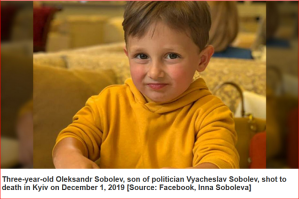 [Image] Three-year-old Oleksandr Sobolev, son of politician Vyacheslav Sobolev, shot to death in Kyiv on December 1, 2019 [Source: Facebook, Inna Soboleva]
[Image] Three-year-old Oleksandr Sobolev, son of politician Vyacheslav Sobolev, shot to death in Kyiv on December 1, 2019 [Source: Facebook, Inna Soboleva] While Sobolev and his wife were leaving his high-end restaurant “Mario” in Kiev this past Sunday, right-wing thugs opened fire on Sobolev’s Range Rover, missing him but hitting his son who was seated in the back of the vehicle. The three-year-old died on the way to the hospital.
Police later apprehended two men who had fled the scene in a black Lexus sedan, Oleksiy Semenov, 19, and Andrei Lavrega, 20. Both are veterans of the ]Ukraine led] war in Donbass in eastern Ukraine where they served as members of the fascist Right Sector’s paramilitary formation until June of this year [2019].
The Right Sector was instrumental in the US- and EU-backed, fascist-led coup in February 2014 that toppled the Yanukovitch government and replaced it with a pro-Western and anti-Russian regime. Since then, the Right Sector has been among the far-right forces that have been heavily involved in the war against Russian-backed separatists in East Ukraine.
As is usual when members of neo-Nazi groups carry out political attacks, the Right Sector and their former battalion commander fraudulently attempted to distance themselves from Lavrega and Semenov, claiming they had lost contact with them since they left Ukraine’s armed forces in June. These claims are not credible.
Lavrega, who has been identified as the principal shooter in the killing, has been a member of the Right Sector for at least half a decade. He had participated in the Maidan movement of 2014 as a member of the Right Sector and perfected his shooting skills as a sniper killing separatist soldiers in eastern Ukraine.
According to his Right Sector battalion commander, Andrei Herhert, Lavrega—also known as “Quiet”—was “one of the best snipers in the war” and “very ideological.”
As a thanks for his service to the right-wing Kiev government, Lavrega received a military decoration from former President Petro Poroshenko for “courage” just last year, in October of 2018.
It is yet unclear exactly why Sobolev [the dead boy's father]—who currently serves as a deputy in Kiev’s Regional Council as a member of Poroshenko’s political party—was targeted for assassination by these fascist thugs, but Sobolev’s business ties to separatist-controlled regions of eastern Ukraine may have run afoul of right-wing forces within the Ukrainian state.
In 1997, Sobolev founded a popular supermarket called “Obzhora” in Donetsk, now the capital of the separatist-controlled Donetsk People’s Republic, and subsequently became wealthy. From 2010 to 2011, Sobolev served as an executive of Ukraine’s state energy company Naftogaz, which is rife with corruption and currently embroiled in the Trump impeachment scandal in Washington.
When the war broke out between the US-installed Kiev government and regions of eastern Ukraine in 2014, several of Sobolev’s supermarket stores found themselves operating under separatist control. In 2016, Ukrainian prosecutors opened a criminal investigation into ties between Sobolev’s supermarket chain and separatist forces. Sobolev maintained that he had sold his share in 2007 and no longer owned stake in the company.
Other reports have suggested that the assassination attempt on Sobolev may have come from rival Donetsk businessman and a former judge of the Ukrainian Economic Supreme Court Arthur Emelyanov. Following the death of his son, Sobolev called for both Emelyanov and another oligarch and associate of former President Poroshenko, Alexander Granovsky, to take lie detector tests along with six other individuals.
Whoever is ultimately responsible for ordering this political assassination and the murder of the three-year-old boy, it is clear that the same far-right forces that were instrumental in the coup in February 2014 and the civil war are now being employed to carry out political assassinations by the Ukrainian oligarchy.
Since the 2014 coup, the number of targeted political assassinations by right-wing neo-Nazi groups like C14 and the Right Sector has skyrocketed. At least 15 people have been murdered in such hit jobs by the far right since 2014. Among them was the well-known Belarusian journalist Pavel Sheremet and the politician Kateryna Handziuk, who was killed in a horrific acid attack by right-wing thugs last year.
In virtually all these cases, the perpetrators have been protected from serious legal prosecution. One of the murderers of Handziuk received a barely three-year prison sentence. A critical role in shielding the neo-Nazis is played by Ukraine’s Ministry of Internal Affairs’ Arsen Avakov, who controls the country’s police force and possesses well-known ties to Ukraine’s most notorious fascist militia, the Azov Battalion.
Avakov is one of the few members of the previous Poroshenko government that have remained in the current Cabinet of Ministers under President Volodmyr Zelensky. He was recently praised by former US ambassador to Ukraine Marie Yovanovitch while testifying before the House of Representatives regarding the Trump impeachment investigation (see also: “The impeachment crisis and American imperialism”). [In what has become Obama's third term, Trump allowed Obama appointee Yovanovitch to stay on the job for two and a half years].
President Zelensky, who was elected in April this year on the basis of promises that he would bring an end to the widely despised civil war in eastern Ukraine that has claimed the lives of over 13,000 people, has maintained a conspicuous silence on this latest political assassination attempt by the far right. Instead, the day after the murder, he posted a message on Facebook to honor two Ukrainian soldiers who were killed while fighting in eastern Ukraine this past weekend."
....................................
Additional source:
12/1/19, "Two Suspects Detained In Killing Of Ukrainian Lawmaker's 3-Year-Old Son," rferl.org
.................................
Among comments
...............................
"Charlotte Ruse
The CIA always manages to dig up the most despicable characters to overthrow governments--Christian fascists in Latin American, Nazis in Eastern Europe, and ISIS in the Middle East and Africa."
...................................
Added: 1/1/2017, Then US Ambassador to Ukraine Marie Yovanovitch promoted killing Russians near Ukraine-Russia border along with US Senators Amy Klobuchar, John McCain, and Lindsey Graham. They promised to extract US taxpayer cash to buy weapons for Ukraine to use to kill Russians:
.......
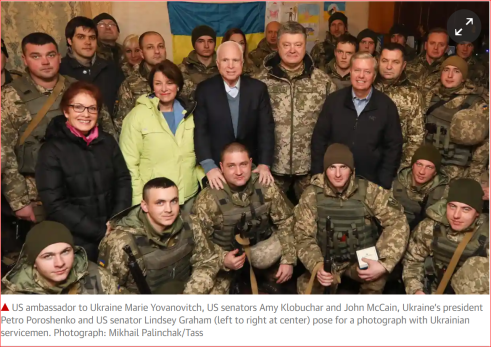
1/1/2017, Image: US officials including US Ambassador to Ukraine Marie Yovanovitch tell Ukraine military they'll go back to Washington and get US taxpayers to give Ukraine soldiers what they need to to fight Putin…."US Ambassador to Ukraine Marie Yovanovitch, US Senators Amy Klobuchar and John McCain, Ukraine’s President Petro Poroshenko, and US Senator Lindsey Graham (left to right at center) pose for a photograph with Ukrainian servicemen. Photograph: Mikhail Palinchak/TassUS,” via UK Guardian, “Speaking during tour of Baltic states, Ukraine, and Georgia, McCain and fellow senators say US will support the countries despite Trump’s comments”
“Fueling More Bloodshed in Ukraine:” In January 2017 Marie Yovanovitch, US Ambassador to Ukraine, was near the front lines in eastern Ukraine with a contingent of Ukraine troops and billionaire Ukraine President Poroshenko. Also present were Senators John McCain, Lindsey Graham, and Amy Klobuchar. “In the presence of Ukrainian President Petro Poroshenko, Graham told the soldiers: “Your fight is our fight…2017 will be the year of offense. All of us will go back to Washington and we will push the case against Russia.” McCain promised the assembled troops, “we will do everything we can to provide you with what you need to win.” [Meaning, to kill Russians].
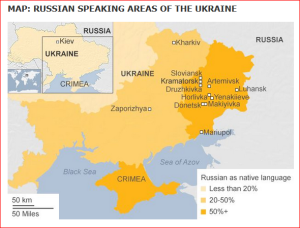
...............................
Comment: The entire US political class is happy to load up the "interagency" with people who function as war industry lobbyists while on the payroll of US taxpayers. The US and Ukraine are corrupt twins. The only way to stop the US war industry is to end its access to US tax dollars. This can be done by breaking the US into a few parts.
.........

No comments:
Post a Comment